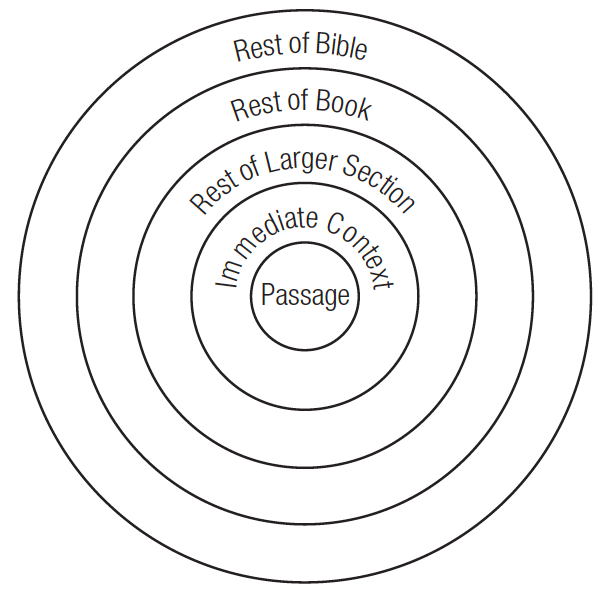UNIT 6:3 STUDY
What Is Surrounding Context?
Surrounding context simply refers to the texts that surround the passage you are studying. You can think of it as the textual world in which your text lives. This includes the words, sentences, paragraphs, and discourses that come before and after your passage. The surrounding context of Romans 12:1–2, for instance, includes the first eleven chapters of Romans as well as Romans 12:3 through the end of the book. In a broader sense, the surrounding context of Romans 12:1–2 is the rest of the books in the New Testament and even the entire Old Testament. These various contexts form circles around your passage.

The immediate context circle is closest to the center since it describes what comes immediately before and after your passage. Do you remember the encouraging verse from 1 Peter 5:7: “Cast all your anxiety on him because he cares for you”? Do you recall its immediate context? The immediate context includes at least verses 5–9, perhaps more.
5In the same way, you who are younger, submit yourselves to your elders. All of you, clothe yourselves with humility toward one another, because,“God opposes the proudbut shows favor to the humble.”6Humble yourselves, therefore, under God’s mighty hand, that he may lift you up in due time. 7Cast all your anxiety on him because he cares for you.
8Be alert and of sober mind. Your enemy the devil prowls around like a roaring lion looking for someone to devour. 9Resist him, standing firm in the faith, because you know that the family of believers throughout the world is undergoing the same kind of sufferings.
We encourage you to give highest priority to the immediate context when determining the meaning of your passage. As the circles of the context diagram illustrate, the closer the circle is to the center, the greater influence it usually has on the meaning of your passage.
A careful look at the immediate context of 1 Peter 5:7 reveals that casting our cares on the Lord is strongly tied to humbling ourselves before him. This relationship grows even stronger when we realize that the word “cast” (v. 7) is actually a participle in the Greek text and should be translated “casting”; note the NASB translation of verses 6–7:
6Therefore humble yourselves under the mighty hand of God, that He may exalt you at the proper time, 7casting all your anxiety on Him, because He cares for you.
The immediate context reveals that humbling ourselves before God means that we entrust our concerns and troubles to God because we know that God loves us and will not let us down. Pride says to God, “I can bear this burden by myself,” whereas humility involves casting our cares on our caring God. What a positive definition of humility! And that insight comes from a careful reading of the immediate context.
The next step is learning to identify the surrounding context of your passage. Before we do that, however, we should first discuss a couple of dangers associated with disregarding context.